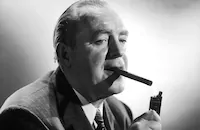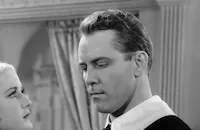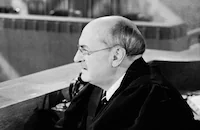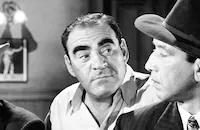Garden of the Moon

Brief Synopsis
Cast & Crew
Busby Berkeley
Pat O'brien
Margaret Lindsay
John Payne
Johnnie Davis
Melville Cooper
Film Details
Technical Specs

Synopsis
When Rudy Vallee has an accident and cannot meet his engagement at the Garden of the Moon nightclub, Toni Blake, the club's press agent, convinces owner John Quinn to hire young bandleader Don Vincente. Don and his band fly out to California from New York for the engagement, but Don almost quits when he learns he is supposed to perform with a woman singer because, in the past, women singers have caused rifts among the musicians. Don's defiance enrages Quinn, who announces that he will end the engagement as soon as Vallee recovers from his accident. The band, which plays swing music, is very popular with the public. Nonetheless, Quinn forces Don to use the woman singer. Don surrounds her with horns so that she cannot be heard, and Quinn retaliates by turning off Don's microphone. Nonplussed, Don sings without it. Hoping to find him a sponsor, so his trip to California will not be a total waste, Toni convinces a chewing gum manufacturer to listen to Don's broadcast. When Quinn hears about her plans, he determines to destroy the broadcast and the next day fires Don. Knowing that Quinn is fascinated by royalty, Toni plants a story about Don's friendship with the Maharajah of Sund. Soon Don is back at work, where Quinn throws a big party for the Maharajah. Toni's plans have succeeded, but Maurice, the maitre-d', almost ruins them when he recognizes the Maharajah as a bad waiter who once worked for him. Despite Don and Toni's efforts, Quinn learns the truth, but Toni convinces him that he will look like a fool if he takes revenge on Don. Don has been so successful that the owners of the hotel where the Garden is located want to sign him for twenty-six weeks. Don refuses to sign the contract, however, because the gum manufacturer has offered him a radio program. Quinn begs Toni to help him meet his obligations to the owners, and she convinces Don to do the radio broadcast from Hollywood. Mistakenly, he later decides that Toni is in league with Quinn and quits. Desperately, Quinn enlists the help of gossip columnist Jimmie Fidler, who warns Quinn over the radio that gangsters are out to kill him. Quinn fakes a shooting, and on his supposed death bed, he begs Don to stay. His ruse works and soon Quinn is back to work, as ornery as ever, with Don as his bandleader.

Director

Busby Berkeley
Cast

Pat O'brien

Margaret Lindsay

John Payne
Johnnie Davis

Melville Cooper

Isabel Jeans
Mabel Todd

Penny Singleton

Dick Purcell

Curt Bois

Granville Bates

Edward Mcwade

Larry Williams
Ray Mayer
Jerry Colonna
Joe Venuti
Jimmie Fidler
Bob Sherwood
Nat Carr
Jack Richardson

Jack Mower

Rosella Towne
Harry Seymour
Lew Harvey
Edgar Edwards
John Hiestand

John Ridgely
Al Herman
John Harron
Charles Marsh
Harry Fox

Ralph Dunn
Hal Craig

Don Defore
James Nolan
Sonny Chorre
Eddie Marr
Selmer Jackson
Mira Mckinney
Thomas Pogue
Crew
George Amy
Hugh Cummings
Al Dubin
Lou Edelman
Leo F. Forbstein
David Forrest
Tony Gaudio
Robert Haas
Ray Heindorf
Gene Lewis
Richard Macaulay
Johnny Mercer
Frank Perkins
Robert Ross
Francis J. Scheid
Howard Shoup
Jerry Wald
Jack L. Warner
Harry Warren

Film Details
Technical Specs

Articles
Garden of the Moon
The plot, taken from a 1937 Saturday Evening Post story, focused on unscrupulous manager Pat O'Brien, who runs the Garden of the Moon nightclub. When Rudy Vallee and his band have to cancel what had promised to be a lucrative engagement, he settles for a two-week fill-in with John Payne and his musical unknowns. At first the two clash over O'Brien's management style, seemingly inspired by the career of Attila the Hun, and the affections of his pretty secretary (Margaret Lindsay). When Payne becomes a star on radio, however, O'Brien uses every trick in the book to keep his suddenly profitable band together. The film's chief gimmick was featuring references to almost every U.S. entertainment columnist and an appearance by Hollywood Reporter writer Jimmy Fidler, whose film reviews awarded pictures bells for quality; he received a resounding one gong from one critic, who suggested that a real actor might have done a better job.
Although he gave Warners' permission to use his name in the film, Vallee never actually appeared. He had, however, just starred for the studio in Gold Diggers in Paris (1938), so the plot point may have been intended to give him a little extra publicity. Sadly, the radio star never hit the jackpot in movies until he came back in the '60s as a character comedian in films like How to Succeed in Business Without Really Trying (1967) and as Lord Phogg on Batman.
Failed publicity for a failed film star may have been a warning sign of the film's flimsiness. Before the picture could even get into production, it suffered a setback when the original leading lady, Bette Davis, decided she'd rather go on suspension. After landing one of her best roles ever, as the temperamental Southern belle in Jezebel (1938), the studio had offered her two lesser films in a row, Comet Over Broadway, in which she would have played an actress who gives up her career to care for her jailbird husband, and Garden of the Moon. The former was never made. It's altogether possible, however, that Jack Warner was simply trying to goad her into going on suspension so he could get away with not paying her until the studio had a more suitable picture ready.
Davis wasn't the only actor bailing on Garden of the Moon. Dick Powell had originally been slated to play the bandleader, but decided to follow in the dramatic diva's footsteps, leaving the role to newcomer John Payne. Working his way up the Hollywood ladder with films like this (and his debut in the much more acclaimed Dodsworth-1936), Payne was on the road to stardom, but Warners' moved too slowly to capitalize on his looks and talent. Instead, he signed a long-term contract with 20th Century-Fox, where he would serve as a reliable leading man to musical stars like Alice Faye and Betty Grable while also distinguishing himself in such classics as Miracle on 34th Street (1947) and film noirs (Kansas City Confidential [1952], The Boss [1956]).
Even without his trademarked musical extravaganzas, Berkeley showed on Garden of the Moon that he fit well with the studio's fast-paced style. He also got some strong comic support from Johnnie "Scat" Davis, who had just introduced "Hooray for Hollywood" in Hollywood Hotel (1937), and Jerry Colonna, who would soon become a regular comic sidekick for Bob Hope on the comedian's radio show and some of his films. Berkeley would do even better with his next film, the straight crime drama They Made Me a Criminal (1939), starring John Garfield. During production, however, Jack Warner tried to get him to pass on a scheduled pay raise. Berkeley left the studio and moved to MGM, where he would direct such rising musical stars as Judy Garland and Mickey Rooney in a string of profitable musicals. Warren would leave Warners', too, moving to Fox, where he would win an Oscar® for the song "You'll Never Know," written for the Payne-Faye film Hello Frisco, Hello (1943).
Producer: Louis F. Edelman
Director: Busby Berkeley
Screenplay: Jerry Wald, Richard Macaulay
Based on a story by H. Bedford-Jones and Barton Browne
Cinematography: Tony Gaudio
Art Direction: Robert M. Haas
Music: Leo F. Forbstein
Cast: Pat O'Brien (John Quinn), Margaret Lindsay (Toni Blake), John Payne (Don Vincente), Johnnie "Scat" Davis (Slappy Harris), Melville Cooper (Maurice), Isabel Jeans (Mrs. Lornay), Penny Singleton (Miss Calder), Curt Bois (Maharajah of Sind), Jimmie Fidler (Himself), Jerry Colonna (Musician).
BW-94m.
by Frank Miller

Garden of the Moon
Quotes
Trivia
Notes
According to Variety, many syndicated columnists, in addition to Jimmie Fidler, appeared in the film. Hollywood Reporter notes that Dick Powell accepted a layoff rather than work in the film. Modern sources note that Powell was to play John Payne's role and that Bette Davis was originally offered the lead. Although Rudy Vallee is referred to in the film, he does not actually appear.















